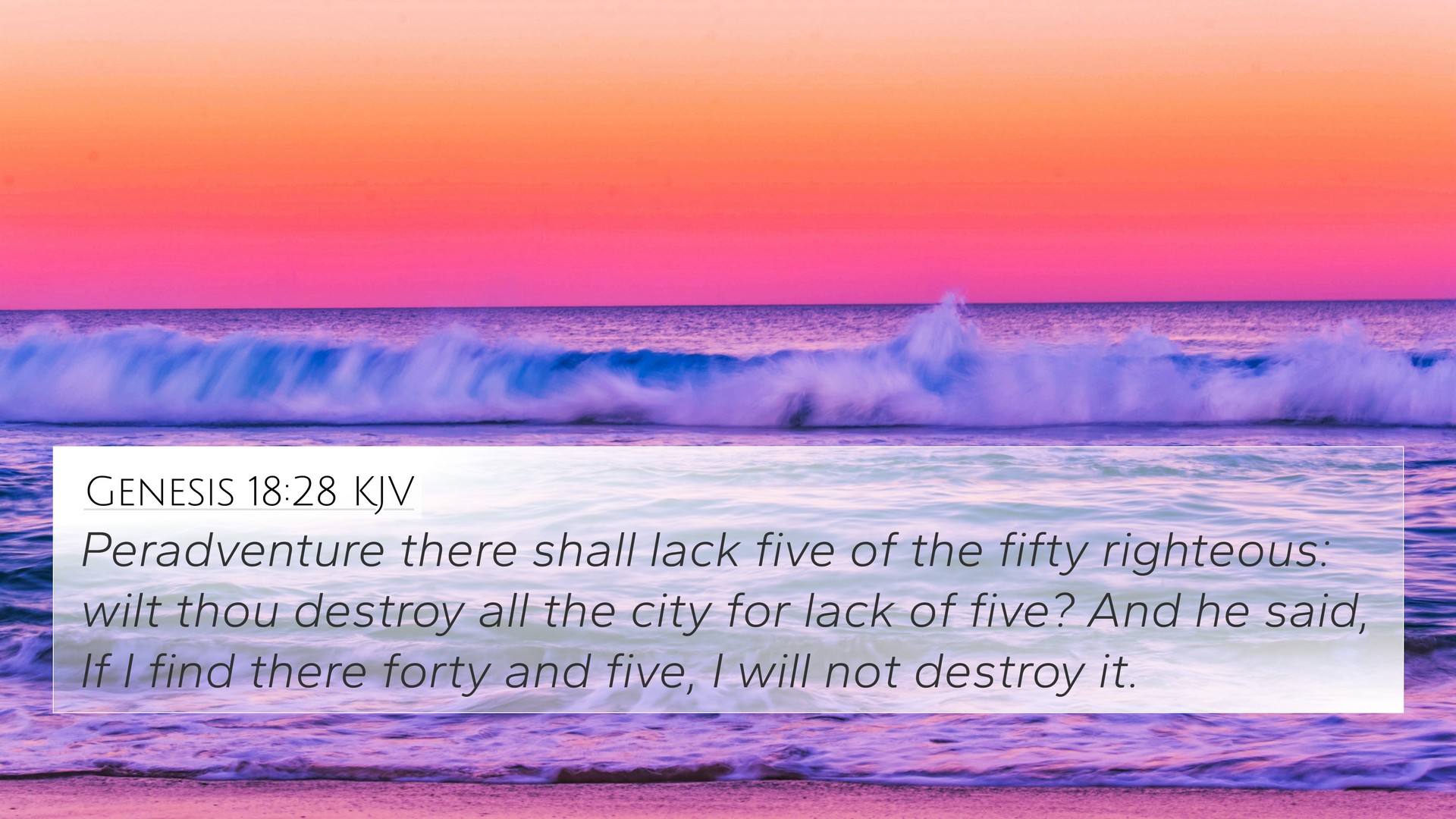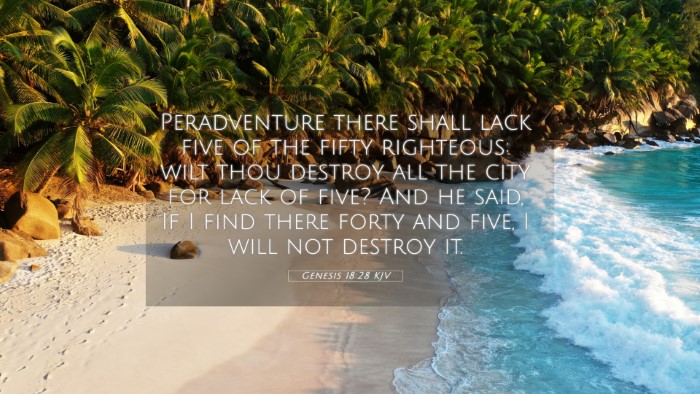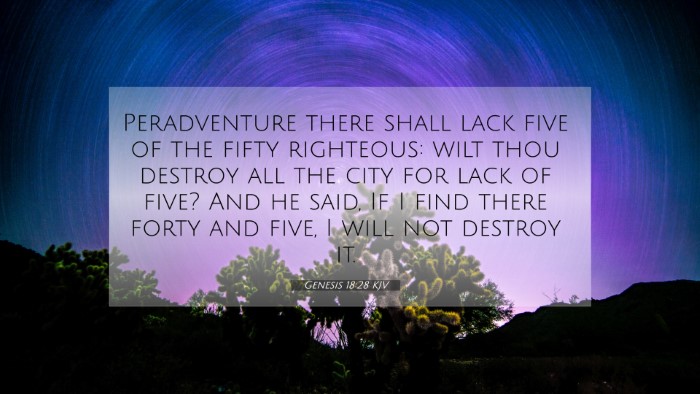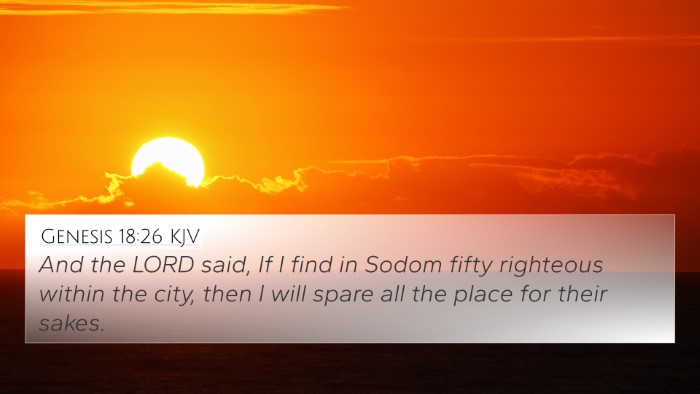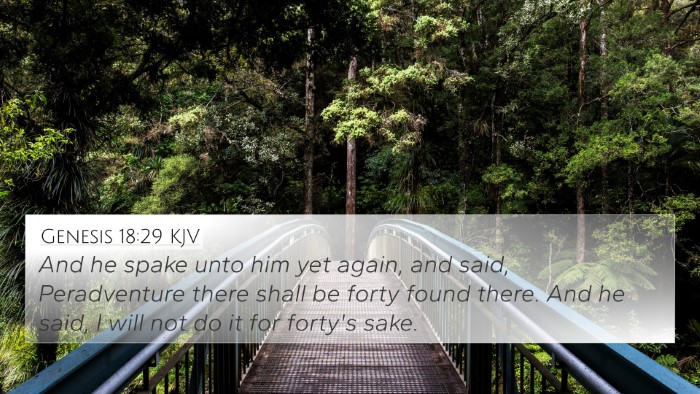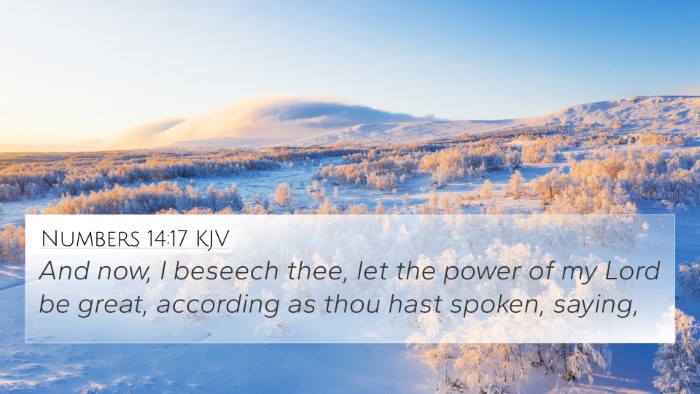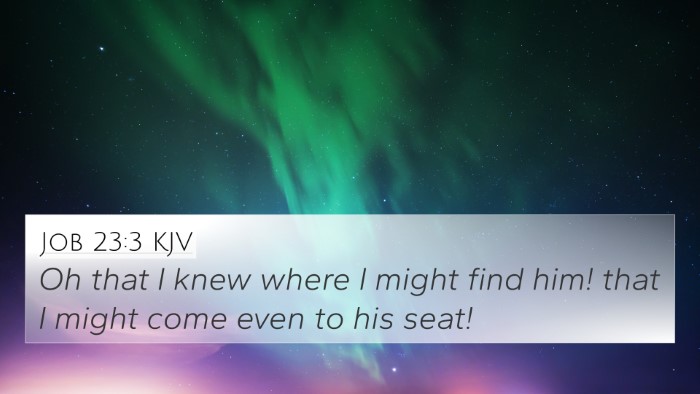Understanding Genesis 18:28
Genesis 18:28 reads: "Peradventure there shall lack five of the fifty righteous: wilt thou destroy all the city for lack of five?" This verse is part of a profound dialogue between Abraham and God regarding the fate of Sodom. Below is a comprehensive interpretation of this verse, drawing on insights from various public domain commentaries.
Verse Context
This verse occurs during a significant prayer of Abraham, where he intercedes for the cities of Sodom and Gomorrah. Abraham's appeal showcases his concern for the righteous within the city and his understanding of God's justice.
Key Themes
- Intercession and Advocacy: Abraham's conversation reflects the role of a true advocate, illustrating how one can appeal to God's nature of mercy and justice.
- The Justice of God: The inquiry about the fate of the city reveals the underlying belief in God's righteousness and the equitable treatment of the righteous versus the wicked.
- Human Responsibility: Abraham's boldness in questioning God highlights the tension between divine sovereignty and human agency.
- Righteousness vs. Wickedness: The emphasis on the 'righteous' versus the 'wicked' in the city leads to a broader understanding of God's judgment.
Biblical Cross-References
Genesis 18:28 connects with several other Bible verses that explore similar themes of intercession, God's justice, and the relationship between God's judgment and righteousness:
- Genesis 18:24: Abraham's initial plea to spare the city if there are fifty righteous individuals.
- Genesis 19:1: The arrival of the angels in Sodom, indicating the impending judgment upon the city.
- Exodus 32:11-14: Moses interceding for the Israelites, reflecting a similar earnestness found in Abraham.
- Jeremiah 5:1: God's command to look for one righteous person in the city, underscoring the rarity of righteousness.
- Ezekiel 18:23: God’s desire for the wicked to turn from their ways, highlighting His mercy.
- Matthew 5:13: Believers as the salt of the earth, informing the significance of the few righteous in society.
- Matthew 10:14: The discourse on judgment as it pertains to the response of the righteous within a city.
Commentary Insights
Through the lens of various commentators, the verse's implications deepen:
Matthew Henry
Henry notes that Abraham’s address to God reflects a profound understanding of God's character. He highlights the need for intercession and underscores the depths of Abraham’s compassion towards the wicked cities.
Albert Barnes
Barnes emphasizes the measure of God's justice, indicating that the destruction of Sodom would be unjust if a small number of righteous individuals were present. He illustrates that God is attentive to the righteousness among the populace.
Adam Clarke
Clarke points out that Abraham’s specific request indicates a relationship with God built on faith and trust. He observes that the negotiation here exhibits an understanding of God’s mercy and justice being harmoniously intertwined.
Thematic Connections
This verse not only stands alone but also connects with broader biblical themes. The following points illustrate these thematic connections:
- God's Mercy: Other scriptures highlight God's desire to show mercy, such as Psalm 103:8, which declares that the Lord is merciful and gracious.
- Role of the Righteous: The New Testament displays the significance of the righteous in Romans 5:12, where the righteousness of one can impact many.
- Prayer and Intercession: Paul’s exhortation for prayer in 1 Timothy 2:1-2 echoes the theme of standing in the gap for others.
Application and Reflection
Genesis 18:28 serves as an encouragement for believers to intercede for others in prayer, reflecting the character of God who desires mercy. As believers, we are called to be the "few righteous" in our environments, advocating for justice and showing compassion. This verse challenges us to understand that our prayers can influence God's actions and decisions in the world around us.
Conclusion
The study of Genesis 18:28 reveals the intricate balance between divine justice and mercy. By exploring its biblical connections and commentary insights, one can appreciate the depth of Abraham's plea and the nature of God’s judgment. Intercession, righteousness, and the merciful character of God are key takeaways from this profound dialogue.
